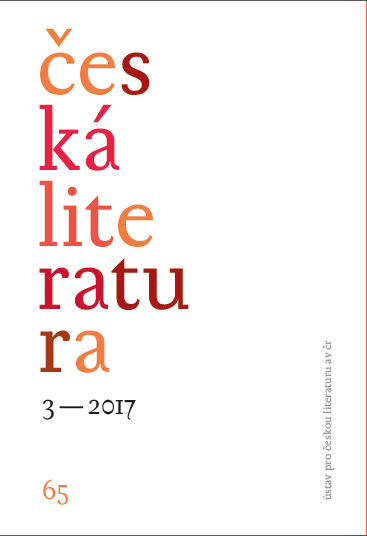My a oni
Us and them
“Forgetting” of the Czech cultural situation under the Protectorate as (inter alia) a literary historical problem
Author(s): Pavel JanoušekSubject(s): Language and Literature Studies, Studies of Literature, Czech Literature
Published by: AV ČR - Akademie věd České republiky - Ústav pro českou literaturu
Keywords: Czech literature;Protectorate;Activists;Catholic literature;avant-garde;literature on Jewish subjects;antisemitism in literature;popular literature
Summary/Abstract: This study focuses on the issues surrounding postwar reflections of Protectorate literature and its changing image as formed in individual periods by the Czech literary public and by literary and cultural historians. This is based on postwar efforts to degrade Protectorate literary output as a non-systemic anomaly brought about by foreign pressure and to redraw it to include previously unpublished output that was written despite the restrictions of the regime. However, it also points out that the literary figures, schools and groups that were denounced as collaborationist by the Syndicate of Writers had formed a part of domestic discourse since at least the 1930s. Hence the punishment of particular individuals was also a verdict on a particular school of thought on society and culture. Thus the condemnation of Catholics, members of the Activists groups and those left-wing intellectuals who tended towards realism had a common denominator: it rejected any vision of the restoration of a binding Order, stemming either from a faith in God, a return to national traditions or a vision of Communism. The opposite was a defence of liberal democracy and associated relativism, as well as experimentation with modern and avant-garde art. The second part of the study follows the way this initial position altered after the arrival of the Communists, who shared a conviction with the Nazis that a new order could be forced upon the world. This exposition aims to show that postwar programmatic limitations on ideological opponents masked the fact that the 1950s spontaneously adopted much from the Protectorate, as well as to point out the coincidences and analogies at the level of literary life and poetics. The most significant proof of this was their endeavour to entirely invalidate opponents and their similar preference for conventional and didactic forms of art. The third section of this paper focuses on the subsequent political relaxation and the attempts at that time to rehabilitate at least some Protectorate artistic activities. It deals with the issue of the avant-garde, whose confrontation with the totalitarianism of the occupiers and the artistic conventions of the era were implicitly interpreted as a challenge that can also be associated with the artistic and social role of creative work at that time. However, it also follows the ongoing attempts to rehabilitate Catholic authors, either with the return of individuals or after 1989 with the defence of Catholicism as a standard school of thought. However, it sees a stumbling block in the issue of whether Catholic activities after Munich and during the occupation can be defended in the context of contemporary political and philosophical pluralism. The final section focuses on the post-1989 reevaluation, that is, whereas the postwar decade was dominated by a clear-cut polarity in values between ‘us and them’, i.e. the Czechs and the Germans, the victims and the culprits, during the postNovember period there was more of a tendency to see ‘us’ as co-offenders, hence the previously rather neglected issue of Czech antisemitism has been foregrounded, as well as e.g. the restriction on ‘trash literature’ (read popular literature), which started under the Protectorate and continued thereafter. The primary emphasis on our own guilt shifts towards the direct connection between the cultural situation under the occupation and the subsequent situation, particularly after 1948. The overall ambition of this paper is to point out that an exposition of literature under the Protectorate should not be based on special-purpose semantic templates, but it should without bias examine the relationship between our current interpretational position and the original historical dimension.
Journal: Česká literatura
- Issue Year: 65/2017
- Issue No: 3
- Page Range: 381-417
- Page Count: 37
- Language: Czech

